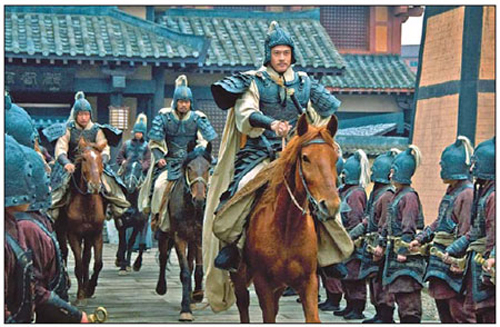

 |
|
A scene from a Romance of Three Kingdoms TV series. Photos Provided to China Daily |
For instance, Killers of the Three Kingdoms is a card game inspired by the heroic characters from Romance of the Three Kingdoms.
The characters represent what it means to be Chinese, such as having a strong faith in Confucius' ideals of loyalty and fidelity, while presenting a Chinese worldview.
If you visit Chinatowns around the world you may be able to see small shrines featuring the crimson-faced Lord Guan Yu, who is best known from the Three Kingdoms and many of the fictional accounts of him in the book.
In Japan, Three Kingdoms is a cultural touchstone and is referred to in military handbooks and even guides CEO decisions. The book is also the basis of best selling video games and manga books.
Written by Luo Guanzhong, it is the country's first historical novel arranged in chapters and tells tales spanning 100 turbulent years from the late Eastern Han Dynasty (AD 25-220) to the end of the Three Kingdoms Period (AD 220-280).
"The Iliad of China" is how Anthony C. Yu with University of Chicago described the book; while Lu Jiande, an English and Chinese language literature researcher at Chinese Academy of Social Sciences, compares it to Ivanhoe by Sir Walter Scott.
The plot revolves around the lords and retainers of three kingdoms - Wei in the north, Wu in the east and Shu in the west - as they fight for control of the country.
Not too much is known about the author except that he was born in a chaotic period when the Yuan Dynasty (1271-1368) was about to be replaced by the Ming Dynasty (1368-1644).
Rumored to be a student of the author of Outlaws of the Marsh, Shi Naian, Luo was a prolific writer of historical fiction.
In Three Kingdoms, Luo combines historical facts with his own interpretation and imagination, re-organizing oral literature, while telling the story skillfully.
One great achievement of the novel is the tightly plotted stories and a rich tapestry of characters.
War stories are a staple element of most cultures and in Three Kingdoms there is betrayal and hugely inventive military strategies, such as Zhuge Liang's "Borrowing Arrows with Straw Boats" in the "Battle of Red Cliffs".
Zhuge is part of the Shu camp and makes an alliance to triumph over the stronger Wei power under Cao Cao. When the two sides confront each other on opposite sides of the Yangtze River near the Red Cliffs, Zhuge's troops run out of arrows.
His solution is to pretend to launch an attack by sending boats with straw dummies. Cao's archers fire at the dummies and Zhuge's forces return with boats loaded with arrows.
From such tales, vivid idioms and proverbs entered the Chinese language. For instance, "Speak of Cao Cao and Cao Cao arrives" is how Chinese say, "Speak of the devil".
The archaeological discovery of Cao Cao's tomb in 2010 and the furor that resulted inevitably owes a lot to the continued popularity of Three Kingdoms.
Both Moss Roberts and C. H. Brewitt-Taylor have rendered the complete text of Three Kingdoms into English.
Roberts' version has faithfully rendered the cultural messages of the original, while Brewitt-Taylor's storytelling is generally considered to be superior, although some readers say it is not as faithful to the original.
For an introduction to the book, Hock G. Tjoa presents the section "Battle of Red Cliffs" and will give readers an idea as to why it is considered an introduction to Chinese thought.